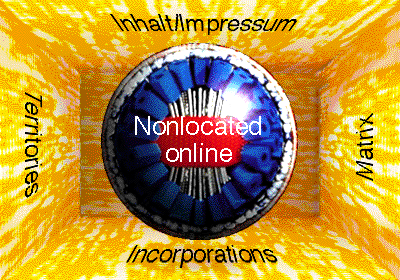
"It,s the trick used by Descartes to
distinguish between hallucinated reality and our real one: what one might focus
on as non non-significant (and today we are also using computers for this
purpose) is that which would still exist in our perception if everything that
matters were no longer there. One example is the history of the idea of the
Greek Hades. In Hades, everything is almost like around here, i.e., the laws of
nature are all the same. There is only a small thing missing, it being a shadow
world: there is no blood, none of the red fluid that makes sensations so
sensational. What remains are the shadow-like entities called relations.
But
if we have the notion that the world can be seized by the steel springs of these
relations, and if it is trus that this notion is false, i.e., that the world is
inconsistent, then there are reasons to be dissatisfied with reality".
Otto E. Rössler, endophysicist, in a paper presented on the
"Imagination" symposium at the Academy of Media Arts Cologne,
1994
Der Trick des Descartes (Zur Unterscheidung zwischen einer
halluzinierten und unserer Realität): Worauf man sich kaprizieren könnte, als
nicht unwichtig, - dafür hat man heute auch die Computer - ist das, was im
Erleben auch noch da wäre, wenn alles, worauf es ankommt, nicht mehr dabei wäre.
Das Beispiel ist in der Ideengeschichte der griechische Hades. Im Hades ist
alles ungefähr so wie hier, z.B. die Naturgesetze sind alle die gleichen. Es
fehlt nur eine Kleinigkeit, es ist ja eine Schattenwelt: Was fehlt ist das Blut,
das rote, das was die Sensationen zu Sensationen macht. Und übrig bleibt nur das
Schattenhafte, oder die Relationen.
.....- Wenn es aber stimmt, daß das
Bild, daß die Welt an den Stahlfedern der Relationen gepackt werden kann, nicht
stimmt, also, daß die Welt inkonsistent ist, gibt es Gründe, mit der Realität
unzufrieden zu sein."
Otto E. Rössler, Endopysiker, in seinem
Vortrag, anläßlich des Symposiums "Einbildungskräfte" an der KHM in Köln,94

